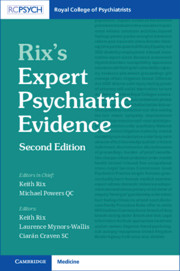Book contents
- Rix’s Expert Psychiatric Evidence
- Reviews
- Rix’s Expert Psychiatric Evidence
- Copyright page
- Contents
- Online Appendices – See Inside Cover for Access
- Contributors
- Foreword to the Second Edition
- Foreword to the First Edition
- Acknowledgements and Preface to the Second Edition
- Acknowledgements and Preface to the First Edition
- Table of Cases
- Table of Statutes and Directives
- Table of Statutory Instruments and Regulations
- Table of Practice Directions
- Table of Codes of Conduct, Guidance, Conventions and Protocols
- Abbreviations
- Chapter 1 The Expert Medical Witness
- Chapter 2 Courts, Laws and Procedures
- Chapter 3 Training, Development and the Maintenance of Expertise
- Chapter 4 Business Matters
- Chapter 5 The Medicolegal Consultation
- Chapter 6 The Report, Amendments, Answers to Questions, Experts’ Meetings and Conferences
- Chapter 7 Reports for Criminal Proceedings and in Prison Cases
- Chapter 8 Reports in Personal Injury Cases
- Chapter 9 Reports for Family Proceedings Relating to Children
- Chapter 10 Reports in Cases Involving Capacity Issues
- Chapter 11 Reports for the First-tier Tribunal (Health, Education and Social Care Chamber) Mental Health
- Chapter 12 Reports in Immigration and Asylum Cases
- Chapter 13 Reports in Employment, Disability Discrimination and Pension Cases
- Chapter 14 Reports for Fitness to Practise, Conduct and Performance Proceedings
- Chapter 15 Reports for Coroners Courts and Fatal Accident Inquiries
- Chapter 16 How to Read an Expert Medical Report
- Chapter 17 Going to Court
- Book part
- References
- Index
- Miscellaneous Endmatter
- References
Chapter 16 - How to Read an Expert Medical Report
Published online by Cambridge University Press: 22 January 2021
- Rix’s Expert Psychiatric Evidence
- Reviews
- Rix’s Expert Psychiatric Evidence
- Copyright page
- Contents
- Online Appendices – See Inside Cover for Access
- Contributors
- Foreword to the Second Edition
- Foreword to the First Edition
- Acknowledgements and Preface to the Second Edition
- Acknowledgements and Preface to the First Edition
- Table of Cases
- Table of Statutes and Directives
- Table of Statutory Instruments and Regulations
- Table of Practice Directions
- Table of Codes of Conduct, Guidance, Conventions and Protocols
- Abbreviations
- Chapter 1 The Expert Medical Witness
- Chapter 2 Courts, Laws and Procedures
- Chapter 3 Training, Development and the Maintenance of Expertise
- Chapter 4 Business Matters
- Chapter 5 The Medicolegal Consultation
- Chapter 6 The Report, Amendments, Answers to Questions, Experts’ Meetings and Conferences
- Chapter 7 Reports for Criminal Proceedings and in Prison Cases
- Chapter 8 Reports in Personal Injury Cases
- Chapter 9 Reports for Family Proceedings Relating to Children
- Chapter 10 Reports in Cases Involving Capacity Issues
- Chapter 11 Reports for the First-tier Tribunal (Health, Education and Social Care Chamber) Mental Health
- Chapter 12 Reports in Immigration and Asylum Cases
- Chapter 13 Reports in Employment, Disability Discrimination and Pension Cases
- Chapter 14 Reports for Fitness to Practise, Conduct and Performance Proceedings
- Chapter 15 Reports for Coroners Courts and Fatal Accident Inquiries
- Chapter 16 How to Read an Expert Medical Report
- Chapter 17 Going to Court
- Book part
- References
- Index
- Miscellaneous Endmatter
- References
Summary
For expert evidence to be tested, a thorough understanding of the evidence is critical. Experts are privileged in that they are able to give evidence, on more than what they have directly observed, and they have the power to influence a judicial decision. For an expert opinion to be successfully challenged, its weaknesses or flawed logic need to be identified, and a thorough understanding of the medical topic is required. Achieving this is not straightforward, as what is being said appears to be based on impenetrable material.
- Type
- Chapter
- Information
- Rix's Expert Psychiatric Evidence , pp. 283 - 288Publisher: Cambridge University PressPrint publication year: 2020

